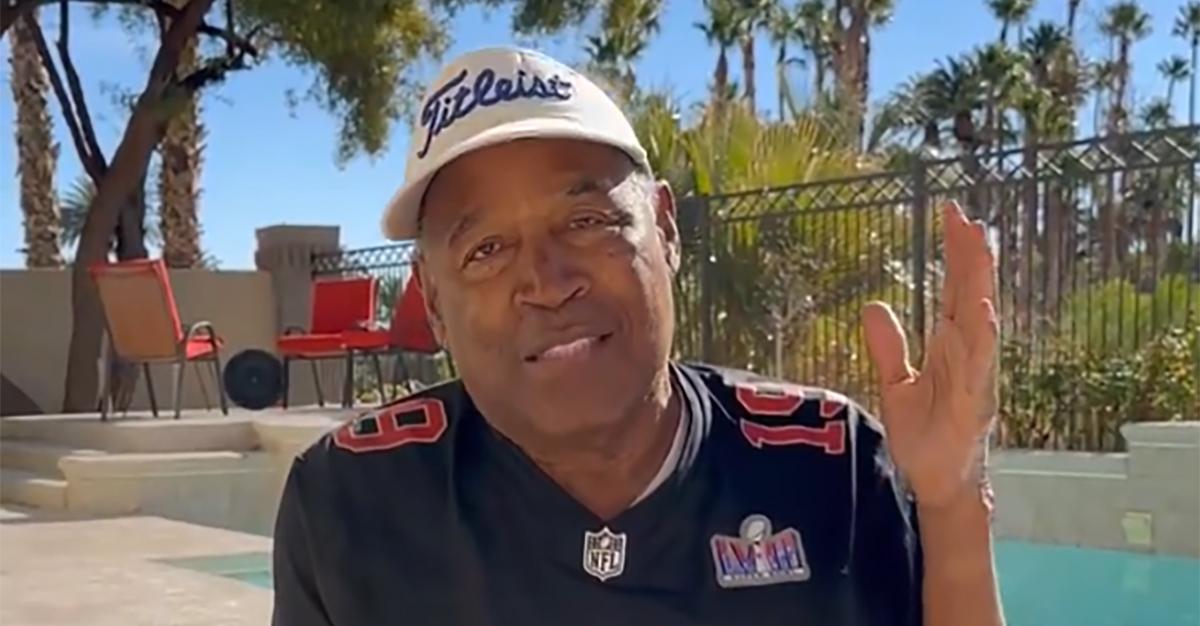When OJ Simpson released his book "If I Did It," it sparked one of the most heated debates in modern history. Love him or hate him, there's no denying this book shook the nation to its core. People were divided, media outlets were in a frenzy, and the public couldn't stop talking about it. But what exactly is the story behind this explosive book? Let's dive in and uncover the truth behind the controversy.
Back in 2006, OJ Simpson decided to write a book unlike any other. Instead of denying his involvement in the murders of Nicole Brown Simpson and Ron Goldman, he chose to do something completely different. He wrote a hypothetical account of how he would've committed the crime—if he did it. Now, before you get too excited, let's clarify: this was all hypothetical. Or was it?
For many, this book was a shocking twist in the ongoing saga of OJ Simpson's life. It reignited old wounds, brought back memories of the infamous trial, and made people question everything they thought they knew about the case. Was this a brilliant move or a massive mistake? Let's break it down and explore the layers of this complex story.
Read also:Your Costco Membership Comes With An Extra 20 Gift Card Right Now Heres How To Get It
Table of Contents
- Biography of OJ Simpson
- The Book: If I Did It
- The Controversy Surrounding the Book
- Why Was the Book Written?
- Impact on Public Perception
- Legal Implications of the Book
- Lessons Learned from the Book
- Media Coverage and Reaction
- Public Opinion on OJ Simpson
- Conclusion
Biography of OJ Simpson
Before we dive into the book itself, let's take a step back and talk about the man behind the controversy. OJ Simpson, or Orenthal James Simpson, was born on July 9, 1947, in San Francisco, California. He wasn't just any guy—he was a football legend, a Hollywood star, and a cultural icon. But his life took a dark turn when he became the prime suspect in the murders of his ex-wife Nicole Brown Simpson and her friend Ron Goldman.
Here's a quick rundown of his life:
| Full Name | Orenthal James Simpson |
|---|---|
| Date of Birth | July 9, 1947 |
| Place of Birth | San Francisco, California |
| Profession | Football player, actor, and author |
| Education | University of Southern California |
Early Life and Career
Growing up in San Francisco, OJ faced his fair share of challenges. But he didn't let that stop him. He became one of the greatest running backs in NFL history, earning the nickname "The Juice." After retiring from football, he transitioned into acting and became a household name. Everything seemed to be going great—until the trial that changed everything.
The Book: If I Did It
Now, let's talk about the book that started it all. "If I Did It" was written by OJ Simpson with the help of ghostwriter Pablo Fenjves. The book was originally supposed to be published in 2006, but it was shelved due to public outrage. The idea behind the book was simple: Simpson would write a hypothetical account of how he would've committed the murders—if he did it.
Here's the kicker: the book wasn't meant to be a confession. It was supposed to be a "what if" scenario, where Simpson explored the crime from a different perspective. But that didn't stop people from jumping to conclusions. Many saw it as an admission of guilt, while others thought it was a clever way to avoid legal consequences.
Why Did OJ Write the Book?
Some people think OJ wrote the book for money. Others believe he wanted to clear his name—or at least give his side of the story. But the truth is, we may never know for sure. What we do know is that the book caused a massive stir and reignited the public's interest in the case.
Read also:Unraveling The Mystery How Old Is Paul Walker A Tribute To A Timeless Star
The Controversy Surrounding the Book
When news of the book broke, people were outraged. How could OJ Simpson write a book about a crime he allegedly committed? The media went into overdrive, and the public demanded answers. Even Simpson's own lawyers distanced themselves from the project, calling it a "grave mistake."
One of the biggest controversies was the fact that the book was originally supposed to be published without Simpson's permission. The publisher, Judith Regan, claimed that the book was a work of fiction and that Simpson wasn't involved in the decision to publish it. But Simpson later clarified that he did, in fact, write the book—and that it was his idea.
Public Reaction
Reactions to the book were mixed, to say the least. Some people thought it was a brilliant move, while others thought it was a disaster. The families of Nicole Brown Simpson and Ron Goldman were particularly upset, calling the book "insensitive" and "offensive." They even sued the publisher, eventually winning a settlement of $33.5 million.
Why Was the Book Written?
So, why did OJ Simpson write the book? Was it for money? Fame? Or something else entirely? While we may never know the full truth, there are a few theories floating around. One theory is that Simpson wanted to give his side of the story—something he wasn't able to do during the trial. Another theory is that he wrote the book to make money, plain and simple.
But here's the thing: no matter what the reason was, the book caused a massive stir. It reignited the public's interest in the case and brought back memories of the infamous trial. For better or worse, "If I Did It" became a defining moment in OJ Simpson's life.
What Was Simpson Thinking?
Some people think Simpson was trying to be clever. By writing a hypothetical account of the crime, he could avoid legal consequences while still giving his side of the story. Others think he was just being reckless, not realizing the impact his words would have on the public. Whatever the case may be, the book was a bold move—and one that will be remembered for years to come.
Impact on Public Perception
When "If I Did It" was first released, it caused a seismic shift in public perception of OJ Simpson. People who had already doubted his innocence now had even more reason to believe he was guilty. The book reignited old wounds and brought back memories of the trial, making it impossible for people to ignore the allegations against him.
But the impact wasn't just limited to public opinion. The book also had a significant impact on Simpson's legal battles. In 2008, he was convicted of armed robbery and kidnapping in Las Vegas, a case that many believe was influenced by the public's perception of him after the book's release.
Changing Public Opinion
Before the book was released, public opinion on OJ Simpson was already divided. Some people believed he was innocent, while others thought he was guilty. But after the book came out, the scales tipped in favor of the latter. Even people who had previously defended him started to question his innocence.
Legal Implications of the Book
From a legal standpoint, "If I Did It" was a disaster. Not only did it damage Simpson's reputation, but it also had serious consequences for his legal battles. The families of Nicole Brown Simpson and Ron Goldman sued the publisher, eventually winning a settlement of $33.5 million. The book was later released in 2013 as "If I Did It: Confessions of the Killer," with all proceeds going to the victims' families.
But the legal implications didn't stop there. In 2008, Simpson was convicted of armed robbery and kidnapping in Las Vegas, a case that many believe was influenced by the public's perception of him after the book's release. The book, while hypothetical, painted him in a negative light and made it difficult for him to win the sympathy of the public—or the court.
Lessons Learned
One of the biggest lessons from the book is the importance of public perception. In today's world, where social media and the internet play such a big role, public opinion can have a massive impact on legal cases. Simpson learned this the hard way, as his book damaged his reputation and made it difficult for him to win legal battles.
Lessons Learned from the Book
So, what can we learn from "If I Did It"? For one, we can learn the importance of public perception. In today's world, where social media and the internet play such a big role, public opinion can have a massive impact on legal cases. Simpson's book showed us just how powerful public perception can be—and how quickly it can change.
Another lesson is the importance of being careful with your words. Whether you're a public figure or just an ordinary person, the things you say can have serious consequences. Simpson's hypothetical account of the crime may have been intended as a thought experiment, but it was interpreted as a confession by many.
What Can We Take Away?
At the end of the day, "If I Did It" is a cautionary tale. It shows us the dangers of playing with public perception and the importance of being careful with our words. Whether you agree with Simpson's actions or not, there's no denying that this book had a massive impact on his life—and on the lives of those around him.
Media Coverage and Reaction
When "If I Did It" was first released, the media went into overdrive. Every major news outlet covered the story, and the public couldn't stop talking about it. The book was the talk of the town, and everyone had an opinion. Some people thought it was a brilliant move, while others thought it was a disaster.
But the media coverage didn't stop there. Even years after the book's release, it continued to be a topic of conversation. The book was eventually released in 2013 as "If I Did It: Confessions of the Killer," with all proceeds going to the victims' families. The media covered this release as well, reigniting the public's interest in the case.
How Did the Media React?
Some media outlets were critical of the book, calling it insensitive and offensive. Others were more sympathetic, arguing that Simpson had a right to tell his side of the story. But no matter what the reaction was, one thing was clear: the book had a massive impact on the public's perception of OJ Simpson.
Public Opinion on OJ Simpson
Public opinion on OJ Simpson has always been divided. Some people believe he's innocent, while others think he's guilty. But after the release of "If I Did It," the scales tipped in favor of the latter. The book reignited old wounds and brought back memories of the trial, making it impossible for people to ignore the allegations against him.
But here's the thing: public opinion isn't always based on facts. Sometimes, it's based on emotions, biases, and personal beliefs. Simpson learned this the hard way, as his book damaged his reputation and made it difficult for him to win legal battles.
What Do People Think Now?
Today, opinions on OJ Simpson are still divided. Some people believe he's a victim of a flawed legal system, while others think he's a guilty man who got away with murder. But one thing is clear: "If I Did It" played a major role in shaping public opinion—and it continues to do so to this day.
Conclusion
In conclusion, "If I Did It" was a book that changed the game. Whether you agree with OJ Simpson's actions or not, there's no denying that this book had a massive impact on his life—and on the lives of those around him. It reignited old wounds, brought back memories of the trial, and changed public perception forever.
So, what can we take away from all of this


